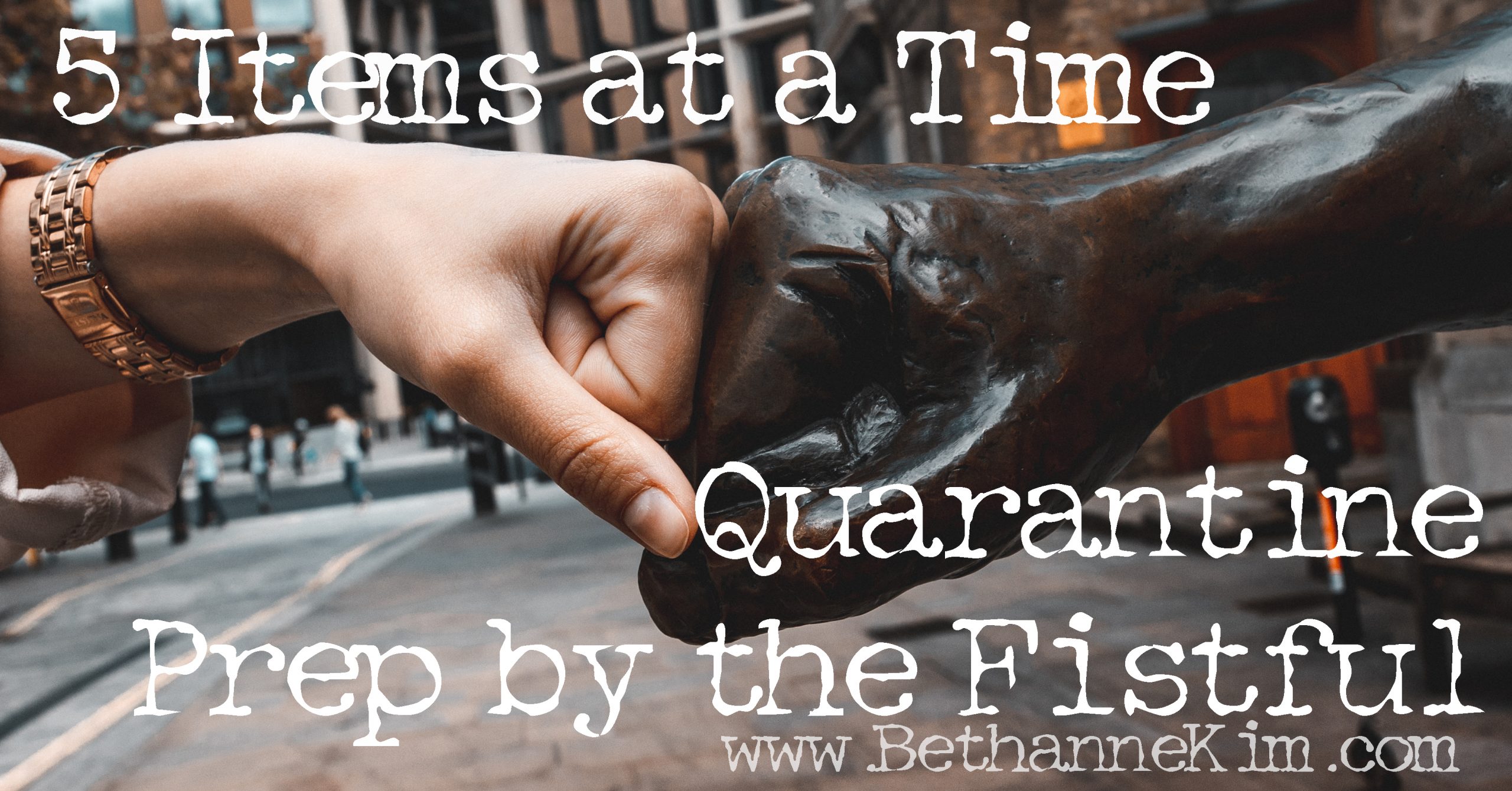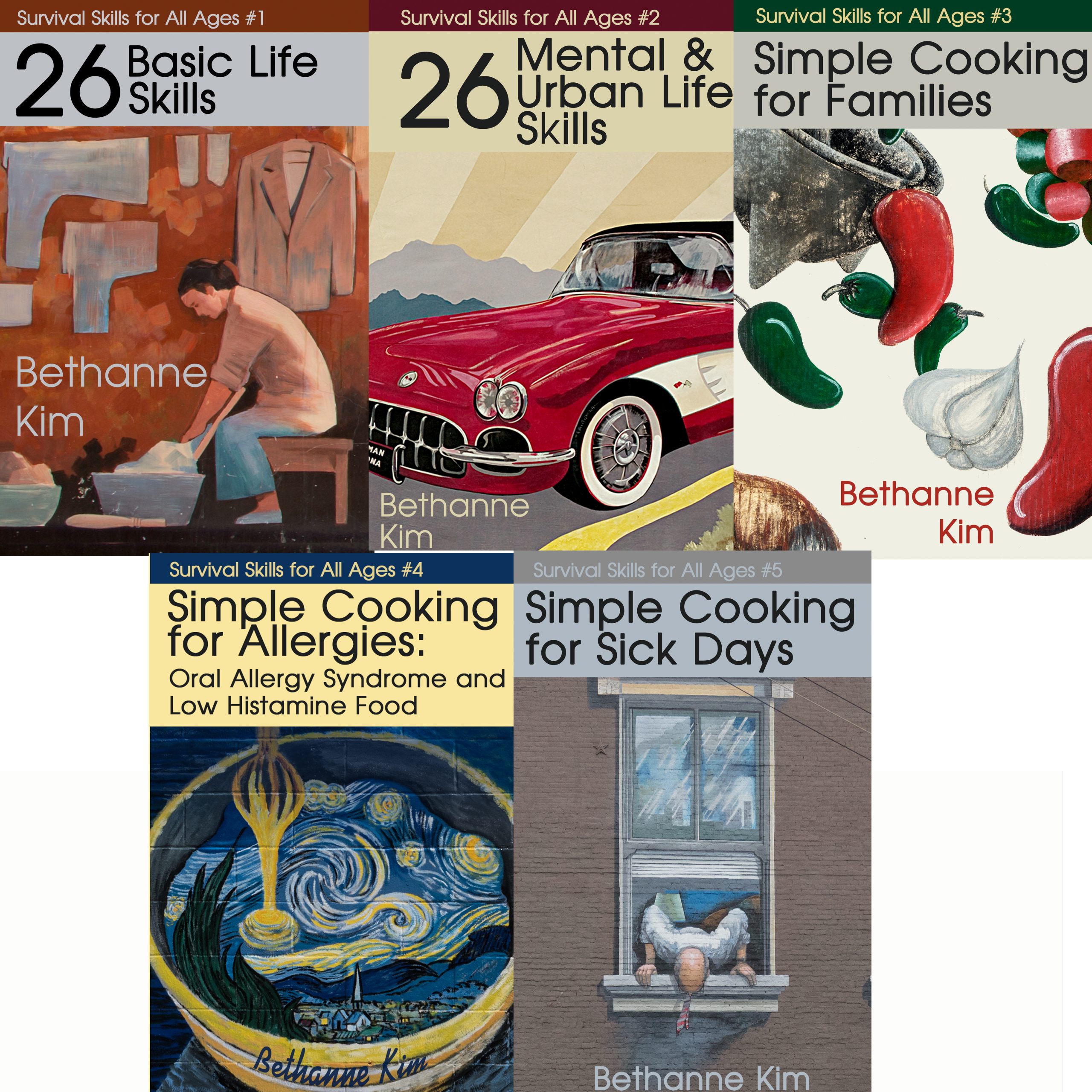
Quarantine Prep by the Fistful: 5 Items at a Time
I have been keeping track of the Coronavirus, COVID-19, news since January. I wrote most of this a week ago. Since then, much of it has become obvious to everyone, like that we will have at least a few weeks of quarantine. Is COVID-19 serious for any particular individual who isn’t a senior citizen? Probably not. Does that mean it isn’t a serious societal concern? Definitely not. Here’s the biggest reason for that: the large number of seniors and already-compromised people who come down with the virus swamp the healthcare system and others can’t receive treatment. This has already been shown in several countries. If your child has an allergy and goes into anaphylaxis and can’t get treatment because the hospital is overwhelmed handling COVID-19 cases, they are every bit as dead as if COVID-19 killed them. The same for Grandma dying of a stroke or heart attack that could’ve been treated if the hospital staff weren’t treating COVID-19 patients who were critical and ahead of her in line for treatment.
I think most of us will end up quarantined for longer than we expect, although some rural areas may not be quarantined at all because they already have minimal contact. It makes sense to prepare for that, but don’t be crazy about it. You are essentially doing your grocery store shopping for an extra month in advance. If you don’t normally eat beans, then don’t buy beans. If you don’t use 72 rolls of toilet paper in a month, then don’t buy 72 rolls of TP.
This might also be a chance to reduce consumption on junk food by simply not buying as much. My family will be distinctly sad about how many bags of chips we have, although they are more than welcome to make their own from potatoes, for example. It’s a good time to teach new skills to the kids, like having them help with cooking, gardening, basic auto maintenance (changing from snow tires to all-season, for example), and home repair.
If you are quarantined for the Coronavirus, you DO NOT need the following:
- A pallet of bottled water: No one expects the water system to suddenly stop working. One case might be nice because if you are truly sick having a bottle of water can be convenient, but it really is just a convenience thing, not a necessity.
- A pallet of toilet paper: If your family normally goes through one four-pack of TP in two weeks, then three four-packs will more than cover your needs for a 2-4 week quarantine.
- Face masks: Yes, I do believe they help, but quantities are very limited right now. Do YOU really need masks more than doctors and nurses working with people being tested for COVID-19 or who have already tested positive for it? I really doubt it. You can always go old-school and use a bandana. It won’t do much, but it can’t hurt either.
- MREs. (Military meals with a long shelf life.)
- Hazmat suits.
What you DO need are things to fight cold and flu symptoms.
- Cold and flu medicine, and definitely fever-reducing medicine. There is some evidence from France that ibuprofen leads to worse outcomes, so try to get more Tylenol than Advil.
- Sick-people food such as saltines, Jell-O(r), pudding, and chicken noodle soup.
- Sick-people drinks such as Ginger Ale, Ginger Tea, and whatever else your family drinks when sick.
- Pedialyte, Gatorade, or other electrolyte-restoring drinks.
- A reliable thermometer.
You also need everyday health care items that you may not be able to run out and get. Be sure to check the expiration dates and refill status for any prescription medications you or your loved ones rely on. If you do have a chronic condition, talk to your doctor to see if there is anything else you should do. I have food allergies and end up in the ER because I need prednisone to stop the reactions. The ER doctor recommended, and my allergist agreed, that I should get a prescription and keep it at home to avoid the ER, especially now. If you are in a similar situation with periodic ER visits for a chronic condition, your doctor might be able to recommend something to help you stay out of the ER.
- Over the counter medications for things like reducing stomach acid, fighting allergies, peri-menopause/menopause symptoms, sore muscles, etc.
- Vitamins.
- Prescription medications, including ones you may not use everyday such as asthma inhalers.
- Alcohol-prep pads, needles, etc. for diabetic care. (Yes, I know the prep pads are scarce now – try to find rubbing alcohol or another substitute.)
- Emergency use medications for heart or other chronic problems, such as nitroglycerine for a heart attack and albuterol for asthma.
You also need everyday items.
- Sanitary items including feminine hygiene products, soap, shampoo, etc. – but you probably already have those on hand.
- Extra laundry detergent because feverish, sweaty people = more laundry, including quilts and other bulky items.
- Extra dish detergent (make sure you aren’t running out) because everyone will be home for all their meals, so you will end up with more dishes to wash.
- Napkins, paper towels, etc. to clean up because everyone is at home. Even more so if they are sick.
- Disposable plates, utensils, and napkins (optional) in case no one is up to doing dishes and you just want to toss everything.
IF you are high-risk, you may want these extra items.
- A pulse-oximeter. Hospitals and doctors use them all the time to check the amount of oxygen in your bloodstream because it’s a good health indicator. They are cheap and easy to use, and you can monitor your own condition a bit this way.
- High-quality room air purifier. Along with wiping down surfaces, this can help slow the spread.
- Re-usable fabric face mask. I just love Breathe Healthy masks and think it’s fabulous that you can re-use their masks. No, it isn’t the protection of an N-95 mask, but it does protect from cough and cold size particles, which seem to be the main airborne concern. And they look a lot more fun!
- Gloves. You can use latex or vinyl if nitrile aren’t available or are too expensive, and if no one has a latex allergy.
- Something to disinfect items like your wallet. (UV)
Food and grocery items.
- Whatever your family normally eats, but enough for a few weeks.
- Whatever your family normally drinks, but enough for a few weeks.
- Sick people food your family likes such as soup and gelatin, but enough for a few weeks. (See above.)
- Some treats your family enjoys to break up the monotony. (Also, Easter candy if you have kids, just in case, to ensure the Easter Bunny still arrives.)
- Some new things you have wanted to try because, honestly, you will have some time to experiment – but make sure you have enough food you know you enjoy first.
An ER go-bag, just in case, because it’s better to be prepared. Once you have this set up, it’s actually a good thing to keep on hand.
- Charging cube and cord(s).
- List of current meds and health history for everyone in the family.
- Snacks/drink. Yes, I know, but here’s the thing: even getting checked in can take a long time and staff will probably be overwhelmed. Getting saltines, a bottle of water, or some ginger ale might take a really long time. Just bring a few things for yourself.
- Entertainment. See #3. Also, if you have an old Fire Stick you no longer use and can get it hooked up in a hospital room, that’ll be way better than staring at the walls or watching the news. Also, Kindles have super long-lasting batteries compared to a phone.
- Any regular meds you need, just a few pills each in case you need to take them before staff are able to process you and get you settled.
There you go. Hopefully that feels less over-whelming and more doable.

Virginia Nicols
Adding the ER bag to your list is smart and unusual. We had an “incident” in our family last year that resulted in multiple ER visits, each wait longer and more painful (and scary) than the next. We needed those bags!